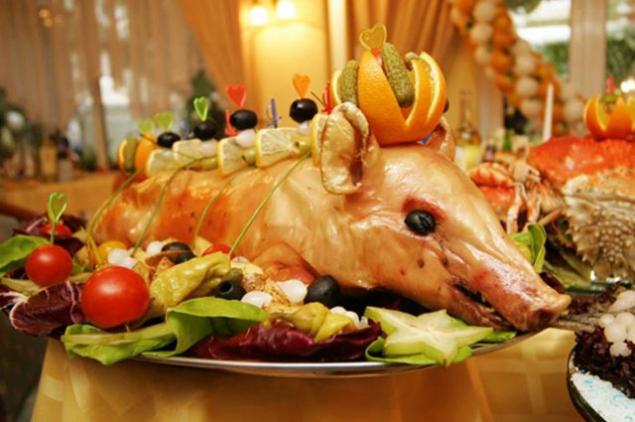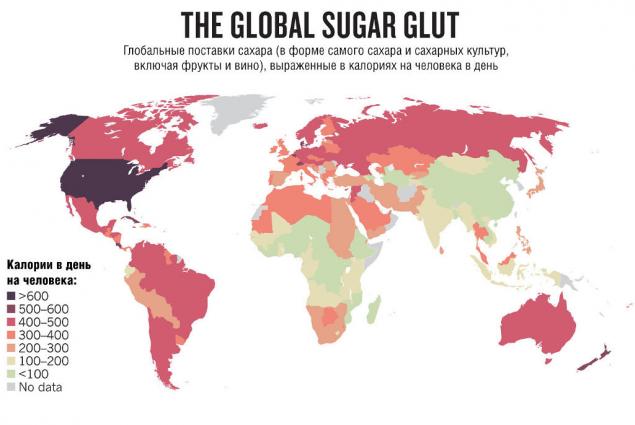755
Sweet food is more dangerous than fat

Every 20 th person in the world is already sick with diabetes! And the number of people with obesity is 30% more than the hungry.
Fat chance: fructose 2.0
Robert Lustig, an endocrinologist and a professor at the University of California in San Francisco, is a multi-year struggle with delusions, proving that the current understanding of health and healthy eating are built on false ideas and bad laws often lobbied pischevik.
The following is a squeeze of his lectures "Fat chance: fructose 2.0».
The problem of global scale
Every 20 th person in the world is already sick with diabetes! And the number of people with obesity is 30% more than the hungry.
childhood obesity rate is increasing most rapidly in the United States, Japan, Russia and other developing countries. Doctors diagnosed with metabolic abnormalities characteristic of obesity in 70% of the population ... And 75% of the US health care budget is spent on treatment of complications or consequences of metabolic syndrome.
The main myth about
obesity We eat more and more ... Men eat an average of 187 per day kcal more than 25 years ago, women - 335 calories, and teenage boys - 275 kcal
. The law of conservation of energy states that all the calories (energy) that we consume, it is necessary to spend, otherwise they will be stored in the body as fat. Because of this people are doing the wrong conclusion: if you eat less and spend more calories, then everything will be fine. But this is not the case because:
1. Not all calories are created equal: sweet foods is much more dangerous than fat;
2. proven that exercise is almost does not help to lose weight, although beneficial to health;
3. not all fat is equally bad: subcutaneous fat does not cause problems with metabolism and increases the risk of dangerous diseases, in contrast to the visceral (interior), which represents a real threat
. Sweet drug
In our mind there are no mechanisms of addiction to fat or salt, sugar but works on the same principle as the hard drugs.
reward system in the brain develops addiction not only to the product itself, but also everything else that triggers the same biochemical processes. So, a person from childhood accustomed to the sweet, already prone to strong drink and drug addiction.
However, soft drinks advertised as useful, "the brain requires glucose" and "diet" products, the lack of fat generously compensated sugar. The use of fructose for 50 years has grown in 5 times! Sugar is used to caramelize and even coloring of the food that does not involve a sweet taste.
Ongoing studies
NHS (Nurses' Health Study) - a study group of 121,701 nurses from 11 states of the USA, enrolled in 1976
. NHS II (Nurses' Health Study II) - a study group of 116,686 nurses from young 14stran enrolled in 1989
. HPFS (Health Professionals Follow-up Study) - a study group of 51,529 healthcare professionals (men) from all 50 states covered by the 1986
. The list of products that cause obesity, the first two places are occupied by chips and french fries.
Among beverages by a wide margin in the lead-sweetened soft drinks, soda and juices.
The biggest problem with the spread of diabetes in Saudi Arabia, Kuwait, Qatar, UAE and
Malaysia, as it is hot countries, where the cold sweet lemonade - a drink that like any soda you can drink liters
. Almost a quarter of all cases of diabetes are not caused by heredity, abstract unhealthy diet or overeating, but only sugar. Conclusion: to stop the epidemic of diabetes, only sufficient to limit the consumption of sugar, as the limited access to any other drugs
. Commerce Engine
About a third of the sugar enters the body with sweet drinks, the sixth part - from desserts, and about half of the sugar is hidden in the food industry, which is not required to be sweet (sauces, bread, pasta)
. In 1990, the American food industry lobbied the new rules Fda (American Committee on the Food and Drug Administration), for which the manufacturers are not required to write on the packaging of the amount of added sugar.
Companies motivated by the fact that so they would have to disclose the recipe, that is the secret of the firm. Until now, the law (and in Russia too) permits do not specify the amount of added sugar.
80% of the products are sold in supermarkets contain added sugar.
Sugar - is the engine of commerce. Because he has a narcotic effect, it forces us to buy and eat more.
A few companies, stocks and incomes continued to grow, despite the crisis in 2008 - a McDonalds, Coca-Cola, Pepsi
. The average person does not realize how deeply he podsazhen sugar. And the government, even in developed countries does nothing to limit the sugar addiction and rapidly growing epidemic related diseases.


























